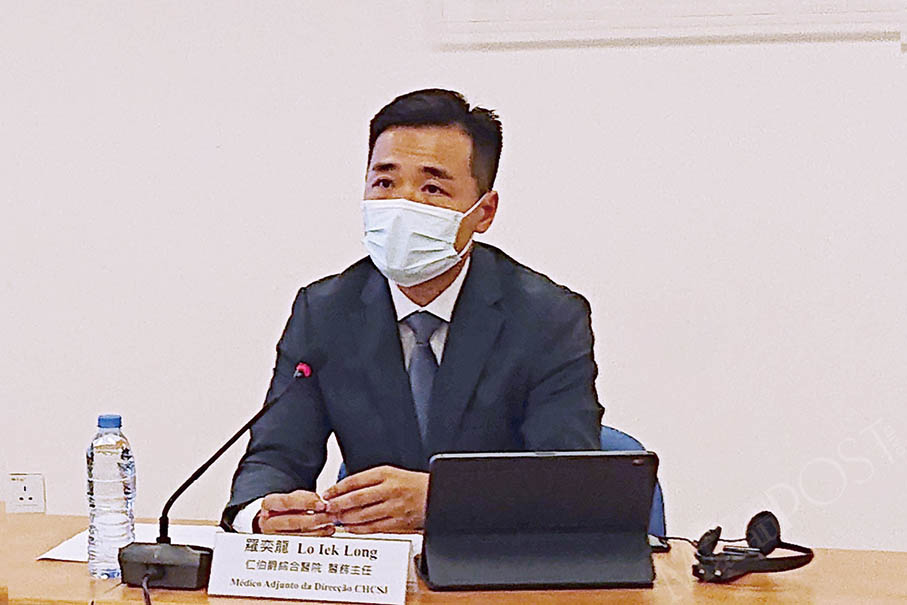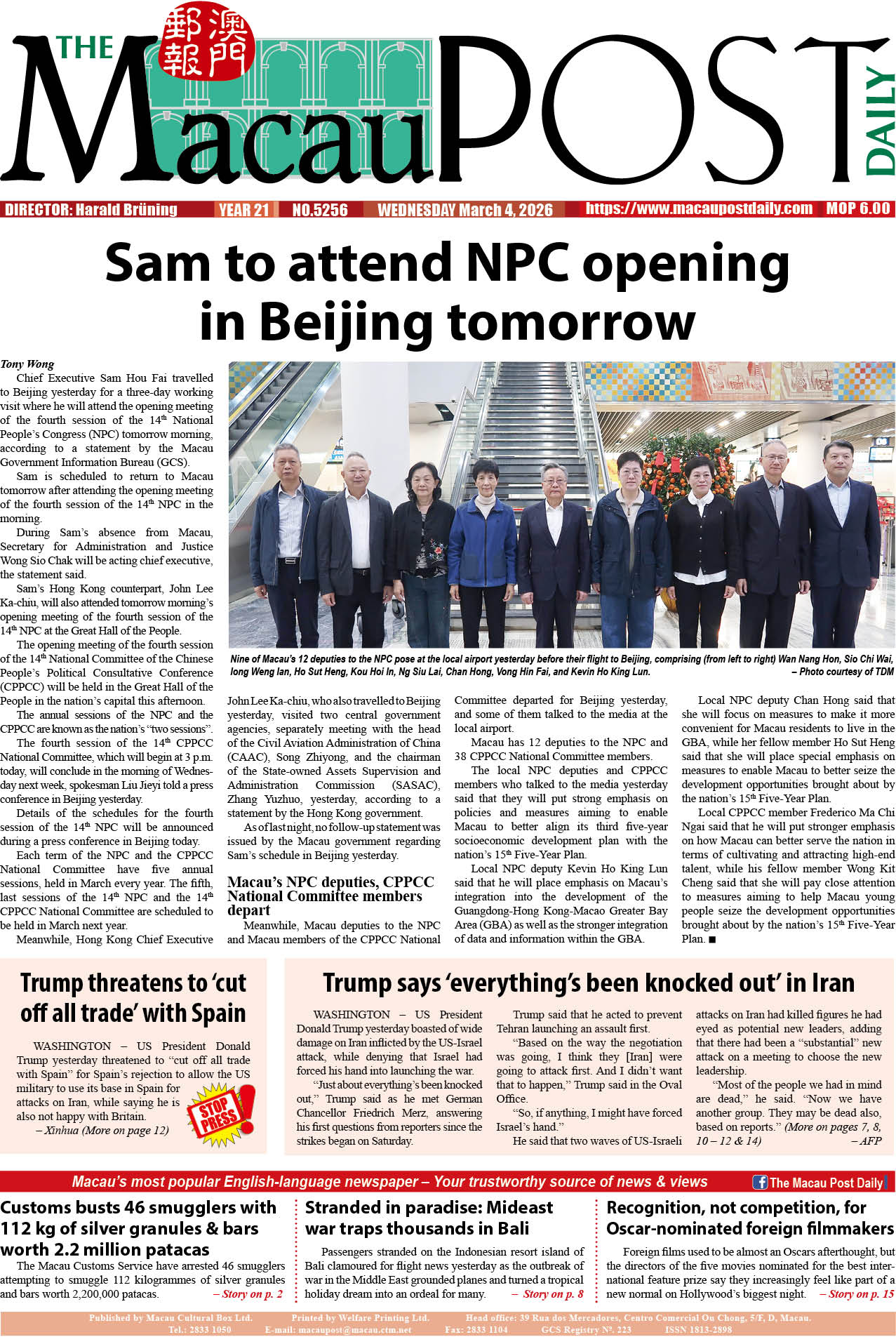Addressing yesterday’s press conference about Macau’s novel coronavirus (COVID-19) situation, Alvis Lo Iek Long, a clinical director of the public Conde de São Januário Hospital Centre, announced that four groups of local residents can now choose to undergo their nucleic acid tests at the public hospital under the local government’s current nucleic acid testing (NAT) scheme, in addition to choosing to undergo the tests at the programme’s testing station in the Taipa Ferry Terminal in Pac On.
The four groups covered by the new measure are senior citizens aged at least 65, minors aged 18 or below, those who hold a Disability Assessment Registration Card, and those who hold a card issued by the Health Bureau (SSM) proving that they are suffering from “special diseases” – namely infectious diseases, drug addiction, tumours, and psychiatric diseases.
A disabled resident needs to be assessed before they can get the Disability Assessment Registration Card, which is issued by the Social Welfare Bureau (IAS).
Lo said that the new measure, which started yesterday, aims to make it more convenient for the four groups of local residents to undergo their nucleic acid tests.
According to Lo, the new nucleic acid testing post for the four groups of local residents is located on the former premises of the Paediatric Joint Assessment Centre at the public Conde de São Januário Hospital Centre. The testing service there runs daily between 9 a.m. and 5 p.m.

Alvis Lo Iek Long, one of the three clinical directors of the public Conde de São Januário Hospital Centre, addresses yesterday’s press conference at the Health Bureau (SSM) about the city’s novel coronavirus (COVID-19) situation. Photo: Tony Wong
The Macau government launched on May 7 a nucleic acid testing scheme for Macau residents who live in Zhuhai and work in Macau (with a Zhuhai residence permit), and Macau pupils and teachers who live in Zhuhai or Zhongshan. The testing was extended the next day to other Macau residents who need to cross the Macau-Zhuhai border checkpoints but do not hold a Zhuhai residence permit. The scheme was later extended to mainland non-resident workers who are eligible for the new exemption measure – which has been implemented since May 11 – from the 14-day quarantine requirement between Macau and Guangdong.
The scheme was extended from May 14 to mainlanders who have entered Macau with a business visit permit, a permit for visiting relatives, or a travel permit for official purposes, or mainlanders who have entered Macau using their passport. People have to make an appointment on https://app.ssm.gov.mo/rnatestbook/ first to undergo the tests, which have a validity of seven days. The first test is free of charge for all Macau residents and non-resident workers, but follow-up tests will cost 180 patacas each. However, mainland visitors have to pay 180 patacas for each test – no fee exemption even for the first test. Cross-border pupils and teachers are exempt from the fee.
The nucleic acid testing at the Pac On testing station runs daily between 9 a.m. and 9 p.m. The Health Bureau (SSM) can test up to 6,000 people per day in the testing programme, which is carried out in collaboration with a third party testing institution – Kuok Kim (Macau) Hygiene Examination Company Limited.
Macau people who live in Zhuhai but work in Macau (with a Zhuhai residence permit), Macau pupils and teachers who live in Zhuhai or Zhongshan, and non-resident workers holding a Zhuhai ID card or residence permit are currently exempted from the 14-day quarantine measure imposed by the Guangdong government.
The Macau government has reaffirmed that having undergone a nucleic acid test does not mean that the person will then be exempted from the current 14-day quarantine measure imposed by Guangdong, pointing out that the Guangdong provincial government has not changed its measure in this respect.
During yesterday’s press conference, Lo pointed out that the four groups of local residents can still choose to undergo their nucleic acid tests at the Pac On testing station, adding that the government has decided to add the new testing post, which aims to provide them with one more location to undergo the tests, after considering that some senior citizens or people with disabilities may find it inconvenient to undergo the tests at the Pac On testing station.
Lo pointed out that the former premises of the Paediatric Joint Assessment Centre at the public hospital is currently being used by the hospital for the nucleic acid testing of newly hospitalised patients, which means that a COVID-19 testing medical team has been working there for some time.
Lo pointed out that the Health Bureau has commissioned a third party testing institution to carry out the nucleic acid testing at the Pac On testing station, adding that with the implementation of the new measure for the four groups of local residents, all the Health Bureau medical staff working at the Pac On testing station will now return to the nucleic acid testing post on the former premises of the Paediatric Joint Assessment Centre for the COVID-19 tests there.
MPay payment for online booking
Meanwhile, Lo also announced that those who have made an appointment online for a nucleic acid test can now choose to pay the testing fee of 180 patacas online by MPay – the online and mobile payment service run by MacauPass.
Lo said that the Health Bureau is discussing with other e-payment service providers the possible launch of their payment service on the bureau’s COVID-19 testing booking website.
Lo pointed out that in addition to paying their testing fee at the Pac On testing station, those who have made an appointment for a nucleic acid test at the Pac On testing station can choose to pay the fee at the bureau’s health centres and health stations and the public hospital before or after they have had their sample collected at the Pac On testing station – where there is only one counter for people to pay the fee.
According to Lo, the payment counters at the bureau’s health centres and health stations and the public hospital do accept cash, MacauPass cards and various other mobile payment services.
No new COVID-19 cases for 47 days
Meanwhile, Lo also pointed out that Macau has not confirmed a new COVID-19 case for 47 consecutive days. All of Macau’s 45 COVID-19 patients have been discharged from hospital.
Lo said that five discharged patients are still undergoing their 14 days of recovery period isolation at the Health Bureau’s Public Health Clinical Centre in Coloane.
Meanwhile, Lo also said that Macau’s public health system is well prepared to tackle a possible “third wave” of the novel coronavirus disease as some local residents studying overseas were expected to return to Macau during the upcoming summer break.
Macau’s “first wave” of COVID-19, which lasted from January 22 to February 4, comprised 10 patients – seven tourists from Wuhan and three locals. After the “first wave”, Macau had not confirmed any new COVID-19 case for 39 consecutive days between February 5 and March 14, before the “second wave” began on March 15 and lasted until April 8 when the 45th case was confirmed.
The majority of Macau’s 35 “second wave” patients were local students returning from overseas.‘Everyone’s shared wish’
Meanwhile, when asked whether the fact that Hong Kong earlier this month confirmed local COVID-19 cases again was an obstacle to the ongoing discussions on the possible gradual relaxation of the current border entry curbs and quarantine measures among Guangdong, Hong Kong and Macau, Lo replied that the gradual relaxation of the measures is “everyone’s shared wish”.
Lo said that the three governments are considering whether the relaxation of the measures would increase the COVID-19 risk during their ongoing discussions on the matter. “They are taking various factors into consideration,” Lo said, adding that “we cannot simply attribute one thing to one particular place, as this seems unfair”.









